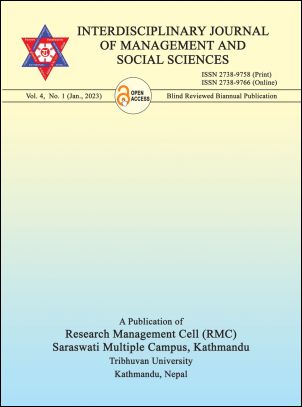Credit Portfolio Management in Nepalese Microfinance Institutions (MFIs): A Shifting Guide to Credit Risk Management
DOI:
https://doi.org/10.3126/ijmss.v4i1.54097Keywords:
Credit portfolio management, credit risk, financial intermediary, financial sustainability, loan portfolio quality, social transformationAbstract
This paper attempts to provide a first step toward understanding the role of credit portfolio management in Nepalese microfinance institutions (MFIs) and overcome those problems associated with credit risk management. The credit portfolio management (CPM) has become most crucial functions of the Nepalese MFIs for sound loan portfolio quality. This study is based on descriptive research design. Several findings are made through the review of the literature that is parallel to achieving the objectives of the study. MFIs are financial intermediaries ("banks") that have a direct impact on economic and social transformation, such as job creation, income generation, social change, and poverty alleviation via financial and non-financial activities. The findings show that a credit appraisal system, scientific interest rate, credit monitoring, loan portfolio diversification system, capital optimization, risk framework development, regulatory management, credit control, credit advisory, and credit research, have reduced credit risk and ensured high-performing loans and financial sustainability. The study recommends that MFI’s portfolio management strategies focus more on the internal causes of delinquency which they have more control over and seek practical and achievable solutions to reimbursement delinquency problems. The study's findings will be useful to BFIs, institutional lenders, microfinance experts, regulators, economists, policymakers, and institutional credit rating agencies. The result reveals that portfolio diversification has a significant impact on credit portfolio management in Nepalese MFIs.

